Is Pomegranate Juice Good For You?
Pomegranate juice, a vibrant and tangy beverage, has been a source of fascination and curiosity for centuries. Known for its deep, ruby-red color and unique flavor profile, pomegranate juice is not only a refreshing drink but also a potent health elixir. This article aims to dissect the layers of scientific evidence supporting the health claims of pomegranate juice and provide a comprehensive view of its impact on everyday wellness. But is pomegranate juice good for you? Let’s explore this question below.
Pomegranates have a rich history, featuring prominently in the medicinal and cultural practices of many ancient civilizations. This fruit’s journey from a symbol of prosperity and fertility to a modern-day superfood is nothing short of remarkable. The nutritional profile of pomegranate juice is impressive, providing a dense array of vitamins, minerals, and antioxidants. Here, we will explore the scope of benefits this delicious juice offers and consider any potential drawbacks.
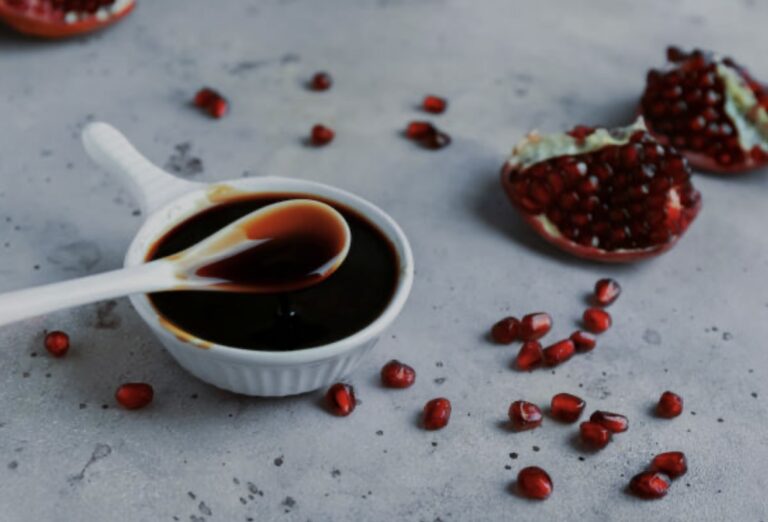
Nutritional Fortitude of Pomegranate Juice
Vitamins and Minerals Galore
Pomegranate juice is a powerhouse of vitamins and minerals, particularly Vitamin C, Vitamin K, and potassium. These nutrients play critical roles in maintaining a healthy immune system, supporting bone health, and regulating fluid balance in the body. Additionally, the antioxidants present, such as polyphenols and flavonoids, offer protection against oxidative stress and inflammation.
Caloric Content and Sugar Considerations
Despite its health benefits, pomegranate juice is relatively high in calories and sugar compared to some other fruit juices. This does not negate its nutritional value but highlights the importance of moderation. In a balanced diet, pomegranate juice can be a healthful addition, providing you keep an eye on portion sizes.
Dietary Fibers: The Missing Component
One drawback of juicing is the loss of dietary fiber found in whole pomegranates. Fiber is essential for digestive health, offering benefits like regular bowel movements and reduced cholesterol levels. To compensate, ensure you include other fiber-rich foods in your diet.
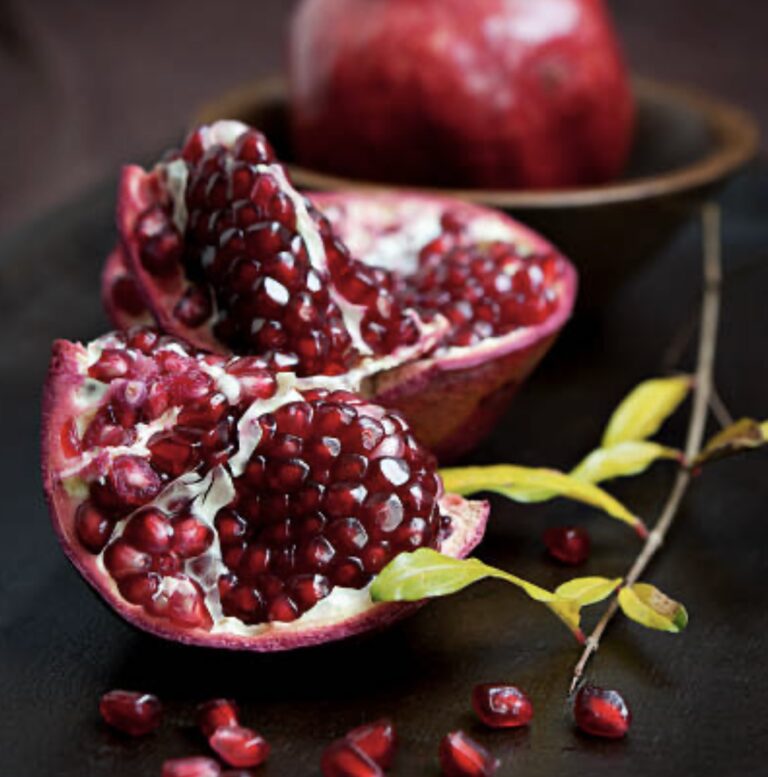
Heart Health and Pomegranate Juice
Blood Pressure Reduction
Studies have shown that regular consumption of pomegranate juice can lead to significant reductions in blood pressure. The antioxidants in the juice are believed to be responsible for these effects, improving the function of blood vessels and reducing arterial stiffness.
Cholesterol and Arterial Health
Pomegranate juice’s impact on cholesterol levels and arterial health is also notable. It has been found to reduce levels of LDL (bad) cholesterol while also inhibiting the oxidation process that leads to plaque formation in the arteries.
Endothelial Function Improvement
The endothelium plays a vital role in regulating blood flow and preventing clotting. Pomegranate juice enhances endothelial function, which can increase blood flow potentially improve exercise performance, and reduce the risk of cardiovascular disease.
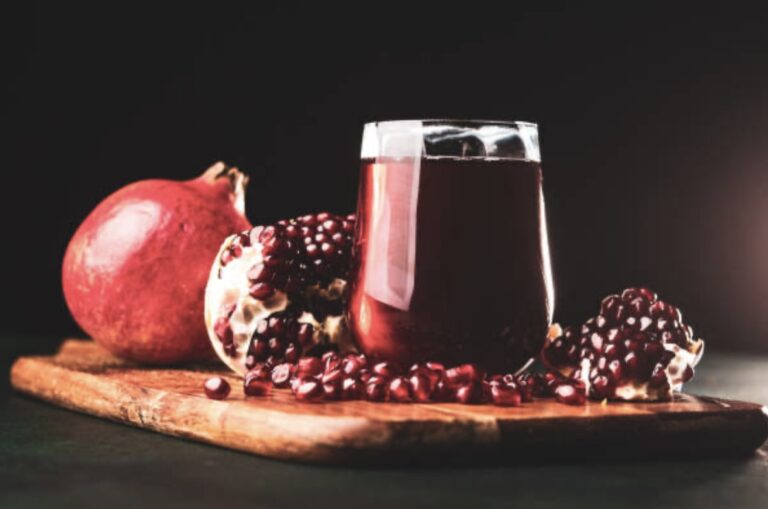
Antioxidant Powerhouse: Beyond Heart Health
Cancer Fighting Potential
Research suggests that pomegranate juice may play a role in preventing various types of cancer, including breast and prostate cancer. The mechanisms are not fully understood but are believed to involve the reduction of inflammation and the inhibition of tumor growth.
Cognitive Benefits and Memory Enhancement
The antioxidants in pomegranate juice have been linked to improved memory retention and cognitive function. This is particularly relevant for aging populations, as regular consumption may offer protective benefits against cognitive decline.
Anti-Inflammatory Effects
The systemic impact of chronic inflammation on health is profound, contributing to many chronic diseases. Pomegranate juice, with its potent anti-inflammatory properties, can be a valuable component in a diet aimed at reducing inflammation.
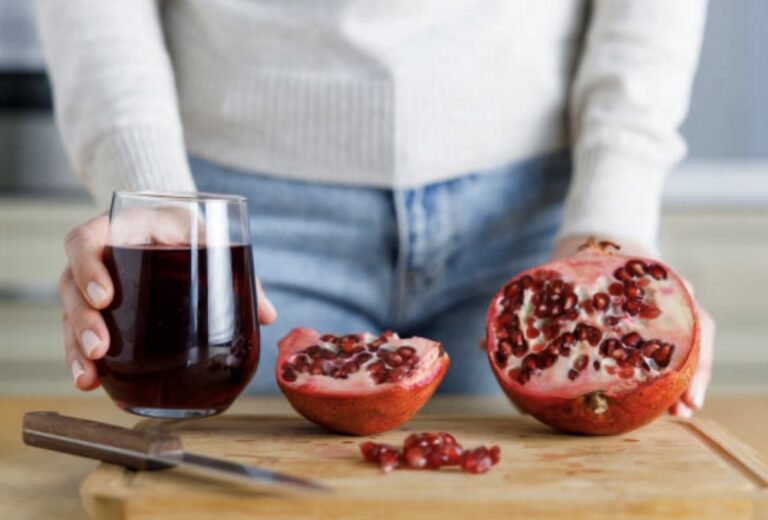
Considerations and Potential Drawbacks
The Sugar Content Dilemma
While pomegranate juice offers numerous health benefits, its high sugar content can be a concern, especially for individuals with diabetes or metabolic syndrome. Moderation and careful monitoring of intake are crucial.
Allergic Reactions and Interactions
Though rare, some individuals may experience allergic reactions to pomegranate. Additionally, pomegranate juice can interact with certain medications, highlighting the importance of consulting with a healthcare provider if you have specific health conditions or are taking medication.
Cost and Accessibility
Regular consumption of pomegranate juice can be costly, and availability may vary by region. Making your own juice or seeking out affordable brands can help mitigate these issues.
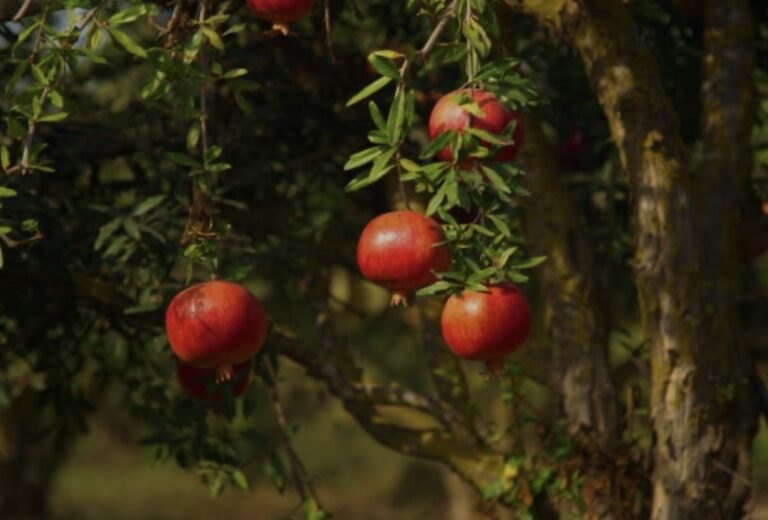
The Simplest Way to Liberate Pomegranate Seeds Like a Pro Chef
Have you ever found yourself wrestling with a pomegranate, wishing there was an easier way to enjoy its tangy seeds without the mess and hassle? You’re not alone. Pomegranates are delicious, packed with nutrients, and a vibrant addition to any dish, but they can be notoriously challenging to open and deseed. Fear not, culinary adventurers and chefs of all levels. I’m about to guide you through a straightforward method to get those seeds out easily, ensuring you’ll never dread handling a pomegranate again.
The Preliminary Strike: Prep Your Pomegranate
Before diving into the main event, let’s set the stage for a successful operation. Choose a ripe pomegranate – it should feel heavy for its size, indicating a bounty of juicy seeds inside. You’ll also need a knife, a bowl of water, and a spoon or something similar to tap the pomegranate.
Step 1: The Cutting Technique
Don’t just slice the pomegranate in half; that’s a rookie mistake that leads to squashed seeds and juice everywhere. Instead, score the skin around the crown of the fruit, then gently pry it off. Next, you’ll see sections separated by white membrane – score the skin along these lines as well.
Step 2: The Water Trick
It’s time for some magic. Submerge your scored pomegranate in the bowl of water. This does two wonderful things: it prevents juice from splattering all over your clothes and makes the seeds (arils) easier to free. Break the pomegranate apart under water, working the seeds loose with your hands. The seeds will sink, and the unwanted membrane will float.
Step 3: Harvesting Your Bounty
Once you’ve freed all the seeds, it’s a simple matter of skimming off the floating pieces and draining the water. You’re left with a bowl full of beautiful pomegranate seeds, ready to be used in your next culinary masterpiece.
Chef’s Tips for Using Pomegranate Seeds
Salads: Add a burst of color and flavor to any salad.
Desserts: Sprinkle over cakes or incorporate them into pastries for a tangy twist.
Drinks: Jazz up cocktails or mocktails with a handful of seeds for a festive touch.
Remember, the beauty of pomegranate seeds isn’t just in their taste or nutritional value; it’s also in how they can transform a dish from ordinary to extraordinary with just a sprinkling.
In the world of cooking and culinary arts, mastering the small details can elevate your dishes and impress even the toughest critics. Don’t let a pomegranate intimidate you. With this guide, you’re more than equipped to tackle this fruit and harness its delicious potential. Whether you’re whipping up a meal for a crowd or just treating yourself, those pomegranate seeds are now your oyster. Add that pop of color and flavor to your dishes – your palate and your guests will thank you.
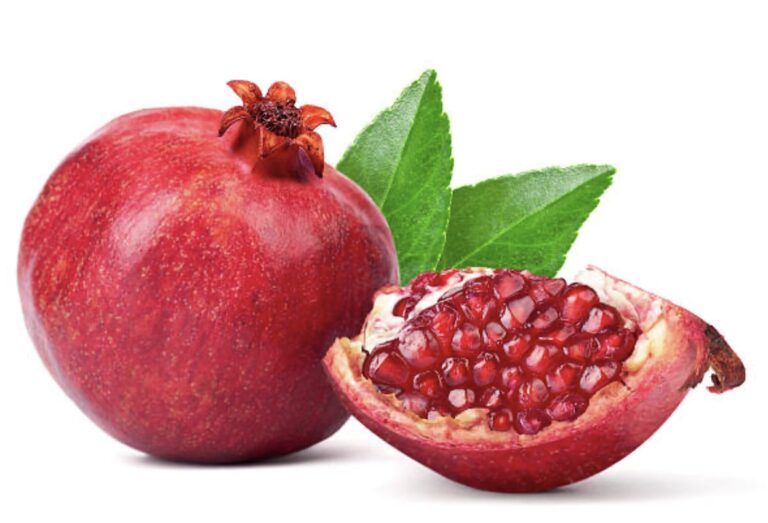
The Bottom Line
Pomegranate juice is a nutrient-rich, antioxidant-packed beverage with a wide array of health benefits. From supporting heart health to potentially reducing the risk of certain cancers, the evidence in favor of including this juice in your diet is compelling. However, moderation is key, and it’s essential to balance the benefits with considerations around sugar content and cost. By making informed choices, pomegranate juice can be a delicious and healthful addition to a balanced diet.
Incorporating pomegranate juice into your diet could be a step towards improved health and wellness. As with any dietary change, consulting with a healthcare professional, especially in the context of pre-existing conditions or concerns, is advisable.
Frequently Asked Questions
While recommendations vary, most studies suggest that about 8 ounces per day can provide health benefits.
Yes, but in moderation and as part of a balanced diet to ensure blood sugar levels remain stable.
While homemade juice can offer superior freshness, many store-bought options are comparable in nutritional value. Look for 100% pomegranate juice without added sugars.
Brands that offer pure, unsweetened pomegranate juice are generally recommended. Always check labels for added sugars and preservatives.
Health benefits can be observed as early as four weeks with regular consumption, though individual results may vary.


